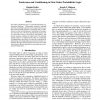1814 search results - page 13 / 363 » Extended First-Order Logic |
120
Voted
EDM
2009
15 years 9 days ago
2009
In this paper, we present a study of a large corpus of student logic exercises in which we explore the relationship between two distinct measures of difficulty: the proportion of s...
119
Voted
CADE
2005
Springer
16 years 2 months ago
2005
Springer
We present the theory and implementation of a theorem prover for first-order intuitionistic linear logic based on the inverse method. The central proof-theoretic insights underlyin...
124
click to vote
GECCO
2003
Springer
15 years 7 months ago
2003
Springer
Over the last few years, a few approaches have been proposed aiming to combine genetic and evolutionary computation (GECCO) with inductive logic programming (ILP). The underlying r...
118
click to vote
KBSE
1999
IEEE
15 years 6 months ago
1999
IEEE
Many domain specialists are not familiar or comfortable with formal notations and formal tools like theorem provers or model generators. To address this problem we developed Attem...
156
click to vote
AAAI
1996
15 years 3 months ago
1996
First-order probabilistic logic is a powerful knowledge representation language. Unfortunately, deductive reasoning based on the standard semantics for this logic does not support...

